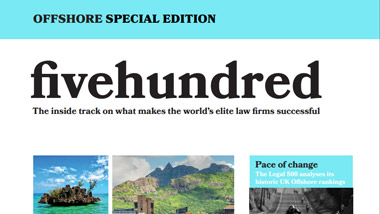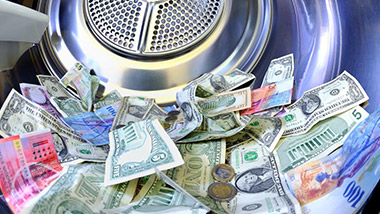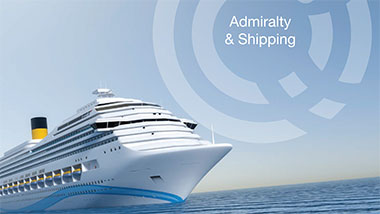Fivehundred Offshore Edition Now Published
“…Turning to the Caribbean, McKinney Bancroft &
Hughes’ senior partner, John F. Wilson K.C., reveals
what gives his firm a competitive edge (page 36).
And last, but not least, Caribbean editor Amy
Ulliott deep dives into the last five years of The
Legal 500’s Caribbean rankings to discover which
international and domestic firms come out ahead
across some of the world’s most lucrative offshore
jurisdictions, as well as highlighting some key
market trends found there (page 6)…”

Enhancements to The Bahamas’ Anti-Money Laundering Regime
Enhancements to The Bahamas’ Anti-Money Laundering Regime: the Financial Transactions Reporting Act, 2018
By: Lemarque Campbell, McKinney, Bancroft & Hughes
Introduction
In the Mutual Evaluation Report of July 2017, the Caribbean Financial Action Task Force (“CFATF”) identified substantial gaps in The Bahamas’ legal and regulatory regime relating to Anti-Money Laundering/Combating the Financing of Terrorism (“AML/CFT”). The Bahamian Government has sought to improve the AML/CFT regime in The Bahamas through the recent enactment of the Financial Transactions Reporting Act, 2018 (the “FTRA”). The FTRA, which came into force on 25th May, 2018, repeals and replaces the Financial Transactions Reporting Act of 2000 (the “2000 Act”) and provides enhanced
provisions to address the gaps identified in the CFATF’s Mutual Evaluation Report.
The FTRA imposes mandatory obligations on financial institutions operating in The Bahamas to (i) verify the identity of existing and prospective customers and clients; (ii) maintain verification and transaction records for prescribed periods; and (iii) report suspicious transactions, which involve the proceeds of criminal conduct.
Significant Enhancements under the FTRA
The FTRA retains a number of provisions from the 2000 Act, but contains new and enhanced provisions regarding (i) financial institutions’ risk assessment and internal control obligations; (ii) oversight of foreign branches and subsidiaries; (iii) prohibition of conducting business with shell banks (i.e. banks which have no physical presence in the jurisdiction in which they are incorporated and licensed); (iv) establishment of anonymous facilities; (v) establishment of correspondent relationships; and (vi) sanctions and
offences for non-compliance with the provisions of the FTRA.
Obligations for Financial Institutions
The following provides a non-exhaustive list of the notable obligations for financial institutions operating in The Bahamas under the FTRA:
1) Risk Assessment: Every financial institution must (i) take appropriate measures to identify, assess and understand its identified risk in relation to its facility holders; and (ii) develop and implement a comprehensive risk management system, which incorporates continuous identification, measurement, monitoring and controlling of identified risks. Additionally, every financial institution should ensure that the outcomes of its risk assessments are documented in writing, kept up-to-date and made available to relevant regulatory bodies upon request.
2) Customer Due Diligence: Every financial institution must undertake customer due diligence, identification and verification measures when opening client accounts or establishing a business relationship with a facility holder, which includes identifying and verifying the beneficial owners of a facility. In this regard, financial institutions shall not establish or maintain anonymous accounts or accounts in fictitious names. Additionally, financial institutions should ensure that they undertake risk based on-going due diligence throughout the course of each business relationship and enhanced customer due diligence measures in certain scenarios.
3) Record Keeping: Every financial institution must maintain all books and records with respect to its facility holders and transactions including, inter alia, records obtained through customer due diligence measures, documents evidencing the identity of facility holders and beneficial owners and records of all domestic and international transactions. All of those records shall be maintained for not less than five years after the business relationship has ended or from the date of the transaction.
4) Internal Controls: Every financial institution must develop and implement procedures for the prevention of activities related to identified risks, as well as designate a compliance officer at the senior management level to be responsible for the implementation and on-going maintenance of its internal procedures and controls. No financial institution shall deal with a shell bank. Further, a financial institution shall require foreign branches and any subsidiaries over which it has control to implement the requirements of the FTRA to the extent that the applicable laws and regulations in the jurisdiction where the foreign branch or subsidiary is domiciled so permit.
5) Suspicious Transactions: Every financial institution must report suspicious transactions as soon as practicable to the Financial Intelligence Unit.
Offences and Penalties
Any financial institution, which includes a director, partner, officer, principal or employee thereof, which fails to comply with its obligations under the FTRA, commits an offence and is liable upon summary conviction to imprisonment for a term of up to five (5) years or to a fine of up to five hundred thousand dollars ($500,000.00) or both. Further, any financial institution convicted of an offence is subject to additional regulatory sanctions and measures and may also be banned from conducting business for a period of time.
The FTRA also introduces administrative penalties for non-compliance with its provisions. In this regard, fines range from fifty thousand dollars ($50,000.00) for individuals to two hundred thousand dollars ($200,000.00) for companies.
Conclusion
With the enhanced provisions contained in the FTRA, financial institutions in
The Bahamas are encouraged to continuously review their risk assessment, customer due diligence and internal controls and measures to ensure that they remain compliant with the FTRA and the Regulations promulgated thereunder.
The above article was published by Lexology on 31st July 2018:
Lemarque Campbell:
Lemarque Campbell is an associate of the firm who specializes in Banking & Finance, Admiralty and Shipping, Corporate & Commercial Litigation and Dispute Resolution.
Download pdf
Liability for oil spills emanating from ships in Bahamian waters
Liability for oil spills emanating from ships in Bahamian waters
By: Rodman Deleveaux, McKinney, Bancroft & Hughes
Marine pollution, in its varying forms, adversely affects oceans, coastal zones and marine ecosystems upon which humans significantly depend. Oil pollution is a form of marine pollution that has gained notoriety since the mid-nineteenth century as a result of the increase in the use of oil tankers and the frequency of accidents which result in oil spills.
In The Bahamas, the conservation and protection of the marine environment is of paramount importance as the Bahamian economy and heritage are inextricably linked to its marine resources. Along with enhancing The Bahamas’ biodiversity and influencing Bahamian culture, the Bahamian marine
environment provides economic benefits through the tourism, fishing, and shipping industries.
Therefore, in addition to adopting and enforcing measures to preserve and protect the Bahamian marine environment, it is imperative that The Bahamas adheres to an international civil liability regime for oil pollution damage which imposes liability for loss or damge suffered as a result of oil spills emanating from ships in Bahamian waters.
The International Convention on Civil Liability for Oil Pollution Damage, 1992 (the “CCL”)
The Bahamas ratified the CCL by way of the Merchant Shipping (Oil Pollution) Act. Accordingly, the provisions of the CCL carry the force of law in The Bahamas. In the event of an oil spill emanating from the cargo of a ship traversing Bahamian waters a claim can be made for loss or damage suffered as a result of the pollution damage.
Scope of application
For a claim to fall within the ambit of the CCL, there would need to be oil pollution damage resulting from the spill of a persistent oil from a ship in the territory, territorial sea, the exclusive economic zone (the “EEZ”) or the equivalent thereof of a party to the CCL. For the purposes of the CCL pollution damage is defined as “(a) loss or damage caused outside the ship by contamination resulting from the escape or discharge of oil from the ship, wherever such escape or discharge may occur, provided that compensation for impairment of the environment other than loss of profit from such impairment shall be limited to costs of reasonable measures of
reinstatement actually undertaken or to be undertaken; (b) the costs of preventive measures and further loss or damage caused by preventive measures”.
It is important to note that the provisions of the CCL do not limit the scope of liability merely to environmental damage and the cost of cleanup operations. Pursuant to the provisions of the CCL, claims can also be made for physical injury and loss of income resuting from the pollution damage.
For the purposes of the CCL, oil is defined as “any persistent hydrocarbon mineral oil such as crude oil, fuel oil, heavy diesel oil and lubricating oil, whether carried on board a ship as cargo or in the bunkers of such a ship.” Additionally, the term ship is defined as “any sea-going vessel and seaborne craft of any type whatsoever constructed or adapted for the carriage of oil in
bulk as cargo, provided that a ship capable of carrying oil and other cargoes shall be regarded as a ship only when it is actually carrying oil in bulk as cargo and during any voyage following such carriage unless it is proved that it has no residues of such carriage of oil in bulk board.” Ships which are registered in countries which are not parties to the CCL also fall within the scope of the
CCL.
Accordingly, a claim may be commenced under the provisions of the CCL should there be a spill of oil being transported on an oil tanker, irrespective of whether the oil sill emanates from the cargo or the bunker of the ship. Furthermore, any claim for compensation under the CCL may only be commenced before the courts of the party to the CCL in whose territory, territorial sea or EEZ the pollution damage has occurred. Accordingly, the courts of The Bahamas would be the proper forum to hear claims made under the CCL for damage caused by pollution in the territory, territorial sea or EEZ of The Bahamas.
Strict liability
The CCL imposes strict liability on the owner of a ship at the time of an incident or, where the incident consists of a series of occurrences, at the time of the first such occurrence. The owner of a ship is defined as “the person or persons registered as the owner of the ship or, in the absence of registration, the person or persons owning the ship. However in the case of a ship owned by a State and operated by a company which in that State is registered as the ship’s operator, ‘owner’ shall mean such company”.
Furthermore, it should be noted that a claim under the CCL cannot be made against a charterer of a ship unless it can be proven that the pollution damage was caused by the charterer’s personal act or omission, committed with intent to cause damage or committed recklessly and with knowledge that such damage would probably result.
Notwithstanding the fact that the CCL imposes strict liability, a ship owner can escape liability if it can be proven that the pollution damage:
(i) resulted from an act of war or a natural phenomenon of an exceptional, inevitable and irresistible character;
(ii) was wholly caused by an act or omission done with intent to cause damage by a third party;
(iii) was wholly caused by the negligence or other wrongful act of any Government or other authority responsible for the maintenance of lights or other navigational aids in the exercise of that function; or
(iv) resulted wholly or partially either from an act or omission done with intent to cause damage by the person who suffered the damage or from the negligence of that person.
Insurance
For ships carrying more than 2,000 tonnes of oil as cargo in bulk, it is incumbent on the ship owner to maintain insurance to cover his liability under the CCL.
Limitation period
Claims under the CCL must be commenced either:
(i) within 3 years of the date when the damaged occurred; or
(ii) within 6 years of the date of the incident which caused the damage.
Limitation of liability
Save in circumstances where it is proven that the pollution damage resulted from the personal act or omission of the ship owner, committed with the intent to cause such damage or committed recklessly and with knowledge that such damage would probably result, the CCL entitles the ship owner who is subject to a claim under the provisions of the CCL to limit his liability to an amount determined by the size of the ship.
Liability outside the scope of the CCL
It should be noted that the CCL does not prohibit those who suffer damage or loss as a result of an oil spill from commencing claims which do not fall within the definition of pollution damage as prescribed by the CCL. Oil pollution often results in loss or damage not directly caused by the oil contamination. An example of this would be loss of life or damage to property caused by an explosion. Claims for such loss would be subject to the applicable domestic law.
The above article was published by Lexology on 31st July 2018:
Rodman Deleveaux:
Rodman Deleveaux is an Associate of the firm and deals primarily with commercial transactions. As a transactional attorney, Rodman is routinely involved in matters involving real estate, banking and finance, asset protection structures, company law and employment law.
Download pdf
Financial Services and Trust and Private Client Brochure
Please click the PDF link to view our Financial Services and Trust and Private Client Brochure highlighting the firm, with it’s wealth of experience in this area, and its lawyers that are frequently called upon to advise high net worth individuals and families on the use of the panoply of off shore Bahamian structures available to them.
Download pdf
Changes in The Bahamian environment: How we can reduce our carbon footprint
Changes in The Bahamian environment: How we can reduce our carbon footprint
As we approach the peak of the summer season, there is one constant which Bahamians have grown to expect: higher temperatures. With the rise of the heat index, energy consumption simultaneously increases and with the elevated use of energy comes extensive environmental and economic concerns.
The increase in energy usage results in an inflation of our carbon footprint, the acceleration of climate change, higher energy costs and a reduction in the supply of energy. The average Bahamian is familiar with the summertime heat, the high gas prices and electricity bills, multiple power outages and the unpredictable weather. Although many people perceive these occurrences as isolated incidences there is more support for the argument that these incidences are connected than there is opposition. Regardless of personal opinions or theories on climate change / global warming, one fact is undeniable: the environment that we live in is changing. As a country which not only depends on the environment daily but also advertises “sun, sand and sea”, the harsh reality of changes in the environment cannot be ignored.
The global recognition of environmental concerns such as energy conservation and climate change has existed since 1992 with the creation of the United Nations Framework Convention on Climate Change Treaty and has since been further strengthened by the implementation of the Paris Agreement in 2015. The Paris Agreement mandates that all parties to the agreement develop a plan and regularly contribute on its efforts to mitigate climate change. Over 195 countries have signed on to the Paris Agreement, including the Bahamas, and many have begun taking crucial cut backs on their country’s contribution to climate change. For example, France has proposed a ban on all petrol and diesel vehicles by 2040. A similar ban will also take effect in Norway and the Netherlands. In the Bahamas, there have been proposals to ban the use of plastic bags and styrofoam by the year 2020 which would decrease the demand for plastic bags and in turn reduce the amount of fuel utilized to make them.
Although we are a small country and contribute very little to the global problem, there are still things that can we can do on a daily basis to reduce our energy consumption. The following are just a few helpful tips that we all can implement:
• Turn off the lights as you leave a room and invest in energy-efficient light bulbs;
• Defrost your fridge and freezer regularly. If your freezer has a build-up of ice, it will have work harder to perform and therefore use more energy;
• Unplug chargers and small appliances from the wall socket. They use power even when the device is not in use;
• Clean the lint screen on your dryer after each load. As with filters, a clogged lint screen means your dryer will be less efficient and take longer to dry your washing which burns more energy (this also applies to wall unit air conditioning filters); and
• Monitor your use of water. Don’t leave the tap running while you are brushing your teeth, shaving or washing your face.
The benefit in practicing energy conservation in The Bahamas is two-fold; firstly, it assists in reducing the strain on the electrical grid which would reduce the likelihood of power outages and secondly, it allow consumers to spend less on electricity bills and at the gas stations.
Berchel Wilson
Ms. Berchel Wilson lends her legal expertise on matters relating to environmental law, taxation, intellectual property, and civil and commercial litigation. bklwilson@mckinney.com.bs

McKinney Bancroft & Hughes Shipping Brochure
Publication
Please click the PDF link to view our Shipping Brochure highlighting our long history and services with Admiralty and Shipping.
Download pdf
The Bahamas – Protecting the Confidentiality of Trusts
Description
The Bahamas – Protecting the Confidentiality of Trusts
By Sean N. C. Moree,
Vanessa Smith
Section 83 of the Trustee Act is an enactment unique to the Bahamian jurisdiction which attempts to codify the rights and obligations of
trustees in relation to disclosure. The disclosure of trust information by trustees has been the subject of judicial debate for centuries;
and as trusts have developed so too has the jurisprudence on the rights of beneficiaries and third parties to trust information and documentation. Recently, the trust has come under intense scrutiny from regulators and
tax agencies alike, so the clarity Section 83 provides not only assists the appointed trustee and designated beneficiaries, but provides comfort to settlors who wish to keep their wishes private and desire to shield his/her trustee from unwanted interference.
Read more by downloading the PDF below.
Download pdf
